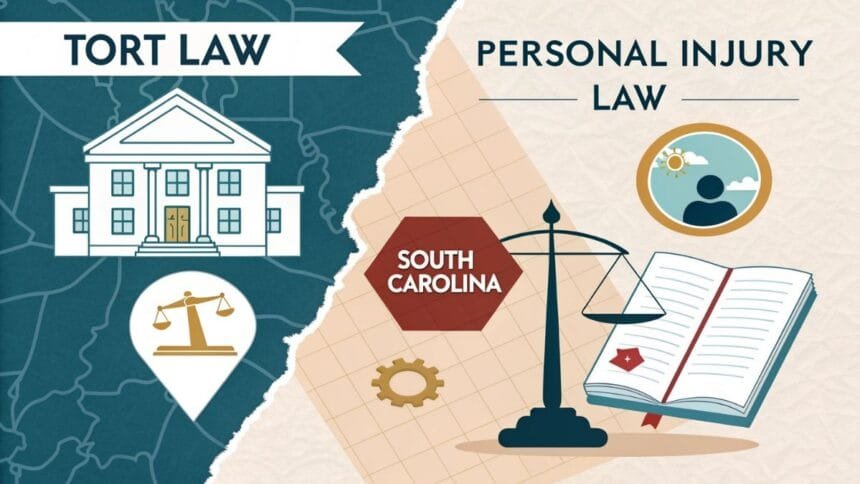When it comes to legal claims arising from harm caused by others’ actions, the terms tort law and personal injury law are often used interchangeably.
In reality, though, they embody different scopes and applications – particularly in the state of South Carolina.
Knowing the distinction is crucial if you’ve been hurt, so you can pursue the right legal path and avoid pitfalls.
What is Tort Law?
Tort law is the broad field of civil justice that addresses civil wrongs committed by a person or entity that causes harm or loss to another.
The purpose of tort law is to hold that person or entity responsible and to restore the injured party to as close to their prior condition as possible (i.e., “make the injured party whole”).
This can include harm to one’s body, property, reputation, emotional well-being, or economic position.
Generally speaking, torts fall into three classes:
- Intentional torts – These are deliberate acts that cause harm: for example, the torts of assault, false imprisonment, or intentionally inflicting emotional distress.
- Negligence – This is the most common form of tort. Here, someone fails to exercise reasonable care, resulting in harm to another. Examples include car accidents, slip-and-fall incidents, or negligent supervision of property.
- Strict liability – Under this category, a party can be held liable even if they did not act negligently or intentionally. A classic example is a manufacturer held responsible for a defective product, or dog‐bite laws in some jurisdictions.
Tort law thus covers a wide range of wrongs – not just personal injuries but also property damage, reputational harm (like defamation), nuisance, trespass, and so on.
What is Personal Injury Law?
Personal injury law is a subset of tort law.
It zeroes in on instances where the injured party is a person who has suffered physical, emotional, or psychological harm due to someone else’s wrongful act.
In other words, whereas tort law can cover damage to property or reputation, personal injury law is focused on bodily or emotional injury to a person.
In South Carolina, many of the personal injury claims tend to arise from scenarios such as:
- Car or truck accidents
- Motorcycle crashes
- Slip and fall incidents in stores or on someone’s property
- Medical malpractice
- Dog bites
- Nursing home abuse or neglect
In these cases, a victim may seek compensation for things like medical bills, rehabilitation, lost wages or earning capacity, pain and suffering, emotional distress, and other consequences of the injury.
Key differences between Tort Law & Personal Injury Law
Although all personal injury claims fall under the umbrella of tort law, the reverse is not true (i.e., not every tort claim is a personal injury claim). To clarify:
- Scope: Tort law is broad (covering many kinds of civil wrongs). Personal injury law is narrower – it deals only with harm to a person.
- Type of harm addressed: Tort law might address property damage, financial loss, reputation, or emotional distress, even without bodily injury. Personal injury law is concerned with physical/psychological harm to a person.
- Legal outcomes & claims: Under tort law, you might see claims for trespass, nuisance, libel, or even product liability without bodily injury. Under personal injury law, you’re seeing claims for bodily or emotional harm, and the legal strategy and damages sought are tailored accordingly.
- Procedural & statutory differences: While many of the rules overlap (such as negligence, fault, causation), the procedural timelines, evidentiary burdens, and damage caps may differ depending on the precise type of tort or injury claim.
So, in short, every personal injury claim is a tort, but not every tort is a personal injury. Recognising which one you have is essential because it determines how you proceed legally.
How South Carolina Treats Personal Injury Claims
In South Carolina, the law provides certain state-specific rules for personal injury (and other tort) claims that anyone considering action should know:
- Statute of limitations: Under South Carolina statute § 15-3-530(5), you generally have three years from the date of the injury (or the date you reasonably should have known about it) to file a personal injury lawsuit. Medical malpractice suits may have slightly different discovery rules and longer limits in certain cases.
- Comparative negligence: South Carolina follows a “modified comparative negligence” rule. That means you can recover damages even if you bear some fault—but only if your share of fault is 50% or less. If you are found to be 51% or more at fault, you are barred from recovering any damages.
- Damage apportionment among multiple parties: Under the South Carolina Contribution Among Tortfeasors Act, when more than one defendant is involved and damage is indivisible, joint and several liability does not apply to a defendant whose fault is under 50% – they are only liable for their percentage.
- Special cases: Suits against government entities may have shorter timelines (often two years) and different procedural requirements.
These rules mean that timing, fault assignment, and identifying the correct defendant(s) matter a lot.
When Should You Consult a South Carolina Personal Injury Lawyer?
If your case is straightforward (minor injury, no dispute, and insurance is cooperating), you might handle it yourself. But in many situations, a lawyer’s help is strongly advised:
- You’ve suffered serious or permanent injuries
- Fault is contested, or multiple parties may bear liability
- The insurance company is delaying or denying your claim
- Your injury resulted from a dangerous product, medical error, or hazardous property condition
- You are unsure about how the law applies (e.g., comparative fault rules, statute of limitations)
Consulting a qualified South Carolina personal injury attorney early helps you collect evidence, preserve your rights (especially given how short the statute of limitations can be), and maximize the potential outcome.



